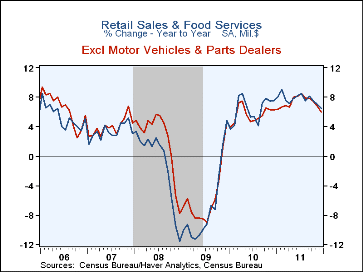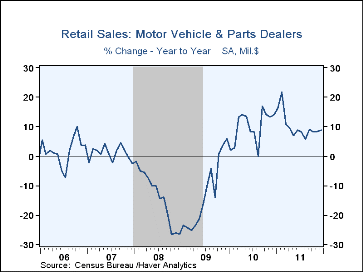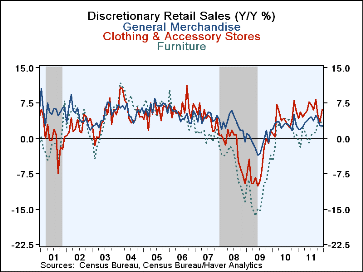 Global| Jan 12 2012
Global| Jan 12 2012U.S. Retail Sales Gain Minimally
by:Tom Moeller
|in:Economy in Brief
Summary
Consumers took a break from raising spending last month. Total retail sales ticked up 0.1% (6.5% y/y) during December following a revised 0.4% November increase, last month reported as 0.2%. Consensus expectations had been for a 0.3% [...]
 Consumers took a
break from raising spending last month. Total retail sales ticked up 0.1%
(6.5% y/y) during December following a revised 0.4% November increase, last
month reported as 0.2%. Consensus expectations had been for a 0.3% rise
according to Action Economics. The gain pulled last year's sales increase to
7.7% after the 6.4% rise during 2010. The December increase owed to a 1.5% jump
in spending on motor vehicles & parts. Less autos, retail sales fell 0.2%
(+6.0% y/y) after a revised 0.3% November gain, last month reported as 0.2%. For
the full-year nonauto sales increased 7.3%. Consensus expectations had been for
a gain of 0.3% in nonauto sales.
Consumers took a
break from raising spending last month. Total retail sales ticked up 0.1%
(6.5% y/y) during December following a revised 0.4% November increase, last
month reported as 0.2%. Consensus expectations had been for a 0.3% rise
according to Action Economics. The gain pulled last year's sales increase to
7.7% after the 6.4% rise during 2010. The December increase owed to a 1.5% jump
in spending on motor vehicles & parts. Less autos, retail sales fell 0.2%
(+6.0% y/y) after a revised 0.3% November gain, last month reported as 0.2%. For
the full-year nonauto sales increased 7.3%. Consensus expectations had been for
a gain of 0.3% in nonauto sales.
Strength in spending last month focused on motor vehicles. Auto sales gained 1.5% (8.8% y/y) compared to a 0.5% m/m slip in unit sales reported earlier this month. Sales of gasoline fell 1.6% (+8.9% y/y) despite a slight m/m gain in prices, when seasonally adjusted by Haver. Sales at food & beverage stores slipped 0.2% (+4.9% y/y) but building materials sales jumped 1.6% (5.8% y/y). Excluding both autos and gasoline, retail sales slipped 0.1% last month (+5.1% y/y) and reversed the November uptick.
Sales of other discretionary items were mixed. Sales of furniture, home furnishings & appliances fell 1.6% (+2.6% y/y) following five months of increase. General merchandise store sales fell 0.8% (+2.7% y/y), the third consecutive monthly decline. Conversely, sales at clothing & accessory stores rose 0.7% (6.0% y/y) after a 0.4% November gain. Sales by nonstore retailers fell 0.4% (+10.6% y/y). Finally, eating out was the thing to do during the holidays so restaurant sales rose 0.7% (8.4% y/y).
The retail sales figure are available in Haver's USECON database. The Action Economics figures are in the AS1REPNA database.
Why Mortgage Refinancing Is Not a Zero-Sum Game from the Federal Reserve Bank of New York is available here
Tom Moeller
AuthorMore in Author Profile »Prior to joining Haver Analytics in 2000, Mr. Moeller worked as the Economist at Chancellor Capital Management from 1985 to 1999. There, he developed comprehensive economic forecasts and interpreted economic data for equity and fixed income portfolio managers. Also at Chancellor, Mr. Moeller worked as an equity analyst and was responsible for researching and rating companies in the economically sensitive automobile and housing industries for investment in Chancellor’s equity portfolio. Prior to joining Chancellor, Mr. Moeller was an Economist at Citibank from 1979 to 1984. He also analyzed pricing behavior in the metals industry for the Council on Wage and Price Stability in Washington, D.C. In 1999, Mr. Moeller received the award for most accurate forecast from the Forecasters' Club of New York. From 1990 to 1992 he was President of the New York Association for Business Economists. Mr. Moeller earned an M.B.A. in Finance from Fordham University, where he graduated in 1987. He holds a Bachelor of Arts in Economics from George Washington University.
More Economy in Brief
 Global| Feb 05 2026
Global| Feb 05 2026Charts of the Week: Balanced Policy, Resilient Data and AI Narratives
by:Andrew Cates








